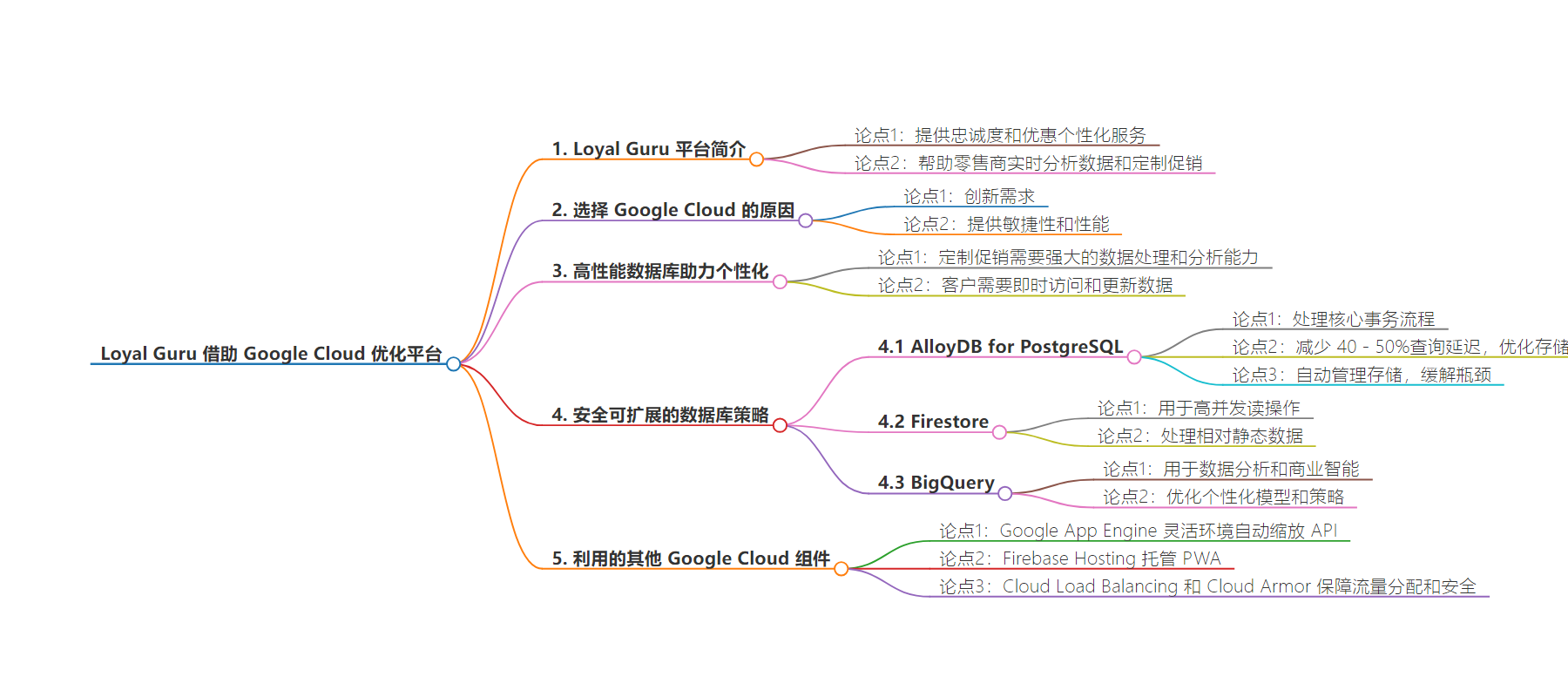包阅导读总结
1.
关键词:Loyal Guru、AlloyDB、Google Cloud、Query Latency、Personalization
2.
总结:Loyal Guru 是一个忠诚度和优惠个性化平台,借助 Google Cloud 的可扩展安全架构,尤其是 AlloyDB 等数据库,克服性能瓶颈,大幅降低查询延迟,为零售客户提供实时个性化体验。
3.
主要内容:
– Loyal Guru 是零售行业的忠诚度和优惠个性化平台
– 旨在帮助零售商根据客户数据定制促销活动
– 面临满足客户快速个性化需求的挑战
– 选择 Google Cloud 合作
– 利用其数据库如 AlloyDB 等提升性能
– 实现创新,应对行业不断变化
– 高性能数据库助力个性化
– 大规模个性化需要高性能、可扩展的数据库
– 客户需要即时访问和更新数据
– 安全可扩展的数据库策略
– AlloyDB 用于核心事务处理,降低查询延迟并优化存储
– Firestore 用于高并发读取
– BigQuery 用于分析
– 还利用多种 Google Cloud 组件确保服务安全高可用
思维导图:
文章地址:https://cloud.google.com/blog/products/databases/loyal-guru-slashes-query-latency-with-alloydb/
文章来源:cloud.google.com
作者:Jesús Antonio Canales Diez
发布时间:2024/7/2 0:00
语言:英文
总字数:965字
预计阅读时间:4分钟
评分:88分
标签:数据库,客户,谷歌云,AlloyDB,性能
以下为原文内容
本内容来源于用户推荐转载,旨在分享知识与观点,如有侵权请联系删除 联系邮箱 media@ilingban.com
Editor’s note: Loyal Guru, a loyalty and offer personalization platform, uses scalable and secure architecture from Google Cloud to help its retail customers deliver highly personalized experiences in real time. By leveraging Google Cloud databases like AlloyDB for PostgreSQL, the company overcame performance bottlenecks and reduced query latency by 40-50%.
At Loyal Guru, we understand the challenges retailers face with engaging customers and driving loyalty amidst rapidly evolving expectations. Our loyalty and offer personalization platform allows retail clients to analyze customer data and tailor promotions dynamically to match precise preferences and context. The goal? Helping retailers create long-lasting relationships through greater relevance.
For us, innovation is vital — the retail world won’t stop evolving, so neither can we. We knew a robust platform would help deliver truly personalized experiences quickly and at scale. That’s why we partnered with Google Cloud for our infrastructure and databases. AlloyDB, along with other Google Cloud products like Firestore and BigQuery, provides the agility and performance needed to continually enhance our platform’s capabilities and help us anticipate emerging trends rather than merely reacting.
Powering personalization with high-performance databases
Loyal Guru is designed to help retailers deeply engage customers through tailored promotions, offers, and brand experiences. Delivering this at scale, however, requires robust data processing and analytics capabilities. Retailers need to ingest and act on customers’ behavioral data in real time across multiple touchpoints to create precise audience segmentation and dynamic offer adjustments that maximize relevance.
Powering these mission-critical personalization functions demands a high-performance, scalable database. Our customers need instant access to customer data, offer details, transactional records, and more for querying and updates as customer interactions occur. Overloaded databases lead to slow responses and disappointing customer experiences. That’s why we chose to build our platform on top of Google Cloud databases.
A secure, scalable database strategy
At the core of our architecture are three powerful Google Cloud data products: AlloyDB for PostgreSQL, Firestore, and BigQuery.
AlloyDB for transactional workloads
We knew that Google Cloud databases offer exceptional scalability and performance, but we didn’t expect the superior performance and fast analytical capabilities we get from AlloyDB, which serves as our relational database. We rely on AlloyDB to power all of our core transactional processes, including user profiles, loyalty program details, and offer redemptions. It ensures our APIs have reliable, low-latency access to this critical data. It also provides a strong foundation to start using the power of AlloyDB and Gemini to build generative AI apps that can help expand our offerings.
Prior to adopting AlloyDB, large traffic spikes from major retail events on Loyal Guru often created bottlenecks. We struggled to deal with data growth, which strained the limits of our storage capacity. AlloyDB’s autopilot feature for managing storage has been instrumental in mitigating these issues, automatically adjusting storage capacity to meet our demands without manual intervention. Overall, we reduced query latency by 40-50% and optimized storage from 2TB to 1.3TB — a 35% improvement.
Firestore for high-concurrency reads
We use Firestore in Datastore Mode for high-throughput read operations on relatively static data, such as loyalty points balances and product catalogs. Its ability to handle massive concurrency without compromising speed makes it ideal for these read-heavy workloads. This allowed our platform to maintain high availability and performance even under the heaviest read loads from retailers using our services.
BigQuery for analytics
To extract maximum value from our data assets, we process large behavioral datasets through BigQuery for analytics and business intelligence. As our data warehouse solution, we use BigQuery to run complex queries, visualize trends, and surface insights that guide strategic decisions. These analytics capabilities are critical for optimizing our personalization models, campaign strategies, and product roadmap based on our customers’ data. BigQuery’s scalable and fully managed infrastructure also enables us to handle massive datasets and complex queries at high speeds without getting bogged down with infrastructure limitations..
In addition to these three data products, we also leverage multiple Google Cloud components to help us provide a secure service with high availability. The Google App Engine flexible environment allows us to automatically scale our Loyal Guru APIs, and we host our progressive web app (PWA) for managing campaigns with Firebase Hosting. We also utilize Cloud Load Balancing together with Cloud Armor for traffic distribution and cloud-native security. With Cloud Balancing we’re able to improve scalability and reliability of our services by improving rotation and escalation policies, at the same time we filter invalid/attack attempts before arriving to the GAE Service. This in conjunction with Cloud Armor, which give us the ability to detect som attack attempts like XSS, SQLi, and other common malicious practices.
